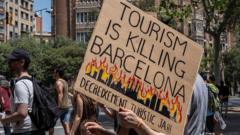A recent protest in Barcelona highlights growing tensions between residents and tourists, as locals call for sustainable tourism management to address skyrocketing rents and housing challenges.
Protests Erupt in Barcelona Against Over-Tourism and Rising Rents

Protests Erupt in Barcelona Against Over-Tourism and Rising Rents
Residents demand action as the city grapples with the impact of tourism on local living conditions.
The streets of central Barcelona echoed with shouts of “Go Home!” as protesters rallied against the overwhelming presence of tourists in the city on Sunday. Many locals expressed frustration over the rising costs of living, attributed to the booming tourism industry that, while economically vital, has begun to overwhelm residents.
Holding up poignant signs such as “Your AirBnB used to be my home,” Marina, a protester, articulated the struggles faced by residents. The influx of tourists, particularly due to vacation rentals and expatriates flocking to the sun-soaked city, has led to escalating rent prices. “We cannot live in this city," she lamented, emphasizing that the current situation is unsustainable.
The protest route drew near one of Barcelona's prime tourist attractions, the Sagrada Familia, which snagged the attention of more than 15 million visitors last year—nearly ten times the local population. Many demonstrators, including Elena, a marine biologist, voiced a desire not to eliminate tourism but to manage it properly. “Young people can’t afford living here," she stated, amidst calls for a balanced approach to tourism that accounts for local needs.
The impact of tourism is felt by all age groups. Pepi Viu, an 80-year-old resident recently evicted from her home, shared her heartbreak over rising rents that have forced her into a hostel. With prices soaring almost 70%, she struggled to find suitable accommodation. “There’s no support. I feel like I have no protection,” she expressed, depicting the plight of long-time residents forced out of their neighborhoods by profit-driven landlords.
In the Gothic quarter, Joan Alvarez fights to retain his family’s apartment of 25 years, holding firm against his landlord’s attempts to raise the rent. “This is central Barcelona, and there’s hardly any of us residents left,” he remarked, standing against the tide of real estate exploitation.
Meanwhile, landlords like Jesus Pereda, who manages tourist rentals, argue they are being unfairly blamed for the city’s housing crisis. He contended that “nomad” workers relocating to Barcelona are driving rents higher rather than tourists themselves. Pereda warned that the city's economy heavily relies on tourism, representing about 15% of Spain’s GDP, and a ban on short-term rentals could lead to broader financial struggles.
As tensions mounted, protesters erupted with chants and firecrackers, highlighting the rifts within the community. With similar protests surfacing across Spain, Portugal, and Italy, the dialogue surrounding sustainable tourism practices remains urgent. Although Barcelona anticipates a record number of tourists this upcoming summer, locals are resolute in their demand for change to ensure a more livable city for residents amid the tourism boom.
Holding up poignant signs such as “Your AirBnB used to be my home,” Marina, a protester, articulated the struggles faced by residents. The influx of tourists, particularly due to vacation rentals and expatriates flocking to the sun-soaked city, has led to escalating rent prices. “We cannot live in this city," she lamented, emphasizing that the current situation is unsustainable.
The protest route drew near one of Barcelona's prime tourist attractions, the Sagrada Familia, which snagged the attention of more than 15 million visitors last year—nearly ten times the local population. Many demonstrators, including Elena, a marine biologist, voiced a desire not to eliminate tourism but to manage it properly. “Young people can’t afford living here," she stated, amidst calls for a balanced approach to tourism that accounts for local needs.
The impact of tourism is felt by all age groups. Pepi Viu, an 80-year-old resident recently evicted from her home, shared her heartbreak over rising rents that have forced her into a hostel. With prices soaring almost 70%, she struggled to find suitable accommodation. “There’s no support. I feel like I have no protection,” she expressed, depicting the plight of long-time residents forced out of their neighborhoods by profit-driven landlords.
In the Gothic quarter, Joan Alvarez fights to retain his family’s apartment of 25 years, holding firm against his landlord’s attempts to raise the rent. “This is central Barcelona, and there’s hardly any of us residents left,” he remarked, standing against the tide of real estate exploitation.
Meanwhile, landlords like Jesus Pereda, who manages tourist rentals, argue they are being unfairly blamed for the city’s housing crisis. He contended that “nomad” workers relocating to Barcelona are driving rents higher rather than tourists themselves. Pereda warned that the city's economy heavily relies on tourism, representing about 15% of Spain’s GDP, and a ban on short-term rentals could lead to broader financial struggles.
As tensions mounted, protesters erupted with chants and firecrackers, highlighting the rifts within the community. With similar protests surfacing across Spain, Portugal, and Italy, the dialogue surrounding sustainable tourism practices remains urgent. Although Barcelona anticipates a record number of tourists this upcoming summer, locals are resolute in their demand for change to ensure a more livable city for residents amid the tourism boom.


















